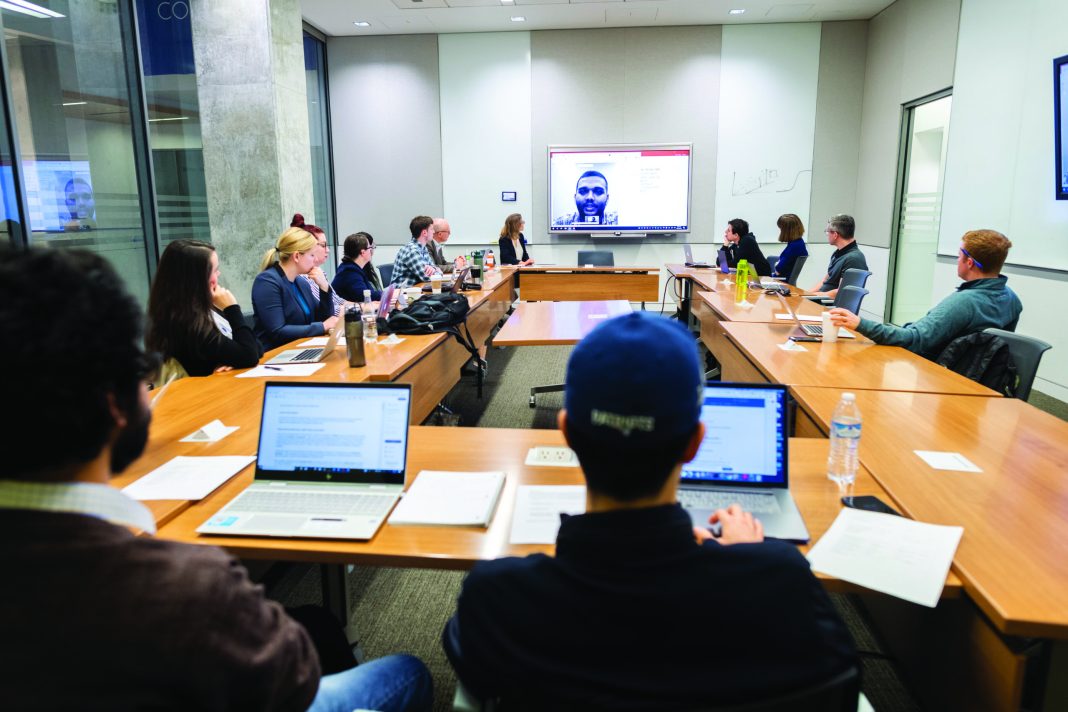From integrating artificial intelligence into legal research to exploring the ethical implications of emerging technologies, these schools are preparing law students for a complex and dynamic legal world.
Georgia State University College of Law
Georgia State’s Legal Analytics and Innovation Initiative has redefined how students prepare for the complexities of a technology-infused legal landscape. The initiative has expanded its certificate program to include a new technology and innovation path and two new courses.
“We believe that all law students need a basic level of technological competency for no reason other than to fulfill their ethical duties to their clients,” said Patrick Parsons, executive director for the Legal Analytics & Innovation Initiative, and associate director for Legal Technology & Innovation at the College of Law.
The Introduction to Tech and Innovation course exposes students to many different legal technology topics. The Legal Process Engineering course helps students learn to craft innovative solutions to legal challenges. The students track issues from start to finish, and along the way they learn how to prepare idea pitches, run project teams, evaluate tech solutions, work collaboratively and produce polished business deliverables.
Parsons said the initiative has helped produce attorneys who bring an innovative mindset to traditional settings. They are often better prepared to select and work with vendors, to understand the technology used and desired by their clients, and to improve efficiency.
“We believe that the ability to manipulate data, break down processes and understand the role technology plays in the practice of law is incredibly valuable for almost any graduating law student today because advancing technology will touch almost any graduating law student,” Parsons said.
Northeastern University School of Law
Northeastern University’s groundbreaking NuLawLab connects artists, designers and law students to help open up the law to more people.
Celebrating its 10th anniversary, NuLawLab launched two cutting-edge projects this year.
The East Boston Spatial Justice Lab will work to understand and measure how the arts, advocacy and organizing for housing justice can strengthen residents’ social and emotional well-being while bolstering the East Boston community’s sense of belonging, healing and revitalization.
The Massachusetts Platform for Legislative Engagement is a web-based tool that allows Massachusetts residents and organizations to submit testimony on pending state legislation. It aims to increase access to the legislative process, engage a broader group of stakeholders and perspectives in policy making, distribute information about pending legislation, and promote greater transparency in government.
Suffolk University Law School
Another Boston law school, Suffolk University, has been a leader in technology for several years. This year, it became the first law school in the nation to launch a multistate system for electronic filing of court documents.
In addition to providing real-time, step-by-step help with court forms through mobile-friendly apps, students from the Legal Innovation & Technology (LIT) Lab met with court administrators in eight states to assist them in building their own smart forms.
The LIT Lab also launched a machine-learning-powered web tool called
ratemypdf.com. It allows courts to upload pdf files of their existing forms and, seconds later, receive AI-driven assessments of the forms’ weaknesses. For example, the tool may point out use of complex legalese or spot imprecise questions.
Seattle University School of Law
Seattle University launched its Technology, Innovation Law and Ethics Program this past spring to help give students a solid grounding in legal concepts and the knowledge needed to practice law related to the tech industry.
The program includes a selection of courses on intellectual property, artificial intelligence, data democratization, transformative technologies and entrepreneurship, along with advice on choosing a curriculum that best fits their career objectives.
The school also takes advantage of its location in Seattle, a center of innovation and technology, to provide students with opportunities to work with tech giants such as Microsoft and Amazon, as well as innovative startups.
Temple University – James E. Beasley School of Law
Temple Law’s Institute for Law, Innovation and Technology focuses on social justice and human rights initiatives around the world. It aims to address factors that have led to pronounced and persistent racial and gender disparities. In addition to scholars and faculty, the institute hires student workers to conduct research on related topics.
Each year, the institute awards two scholarships to students interested in deepening their research on the intersection of technology and society.
This fall, it is organizing a career fair where Philadelphia-area law students can meet potential employers from industry, civil society and the public sector.

